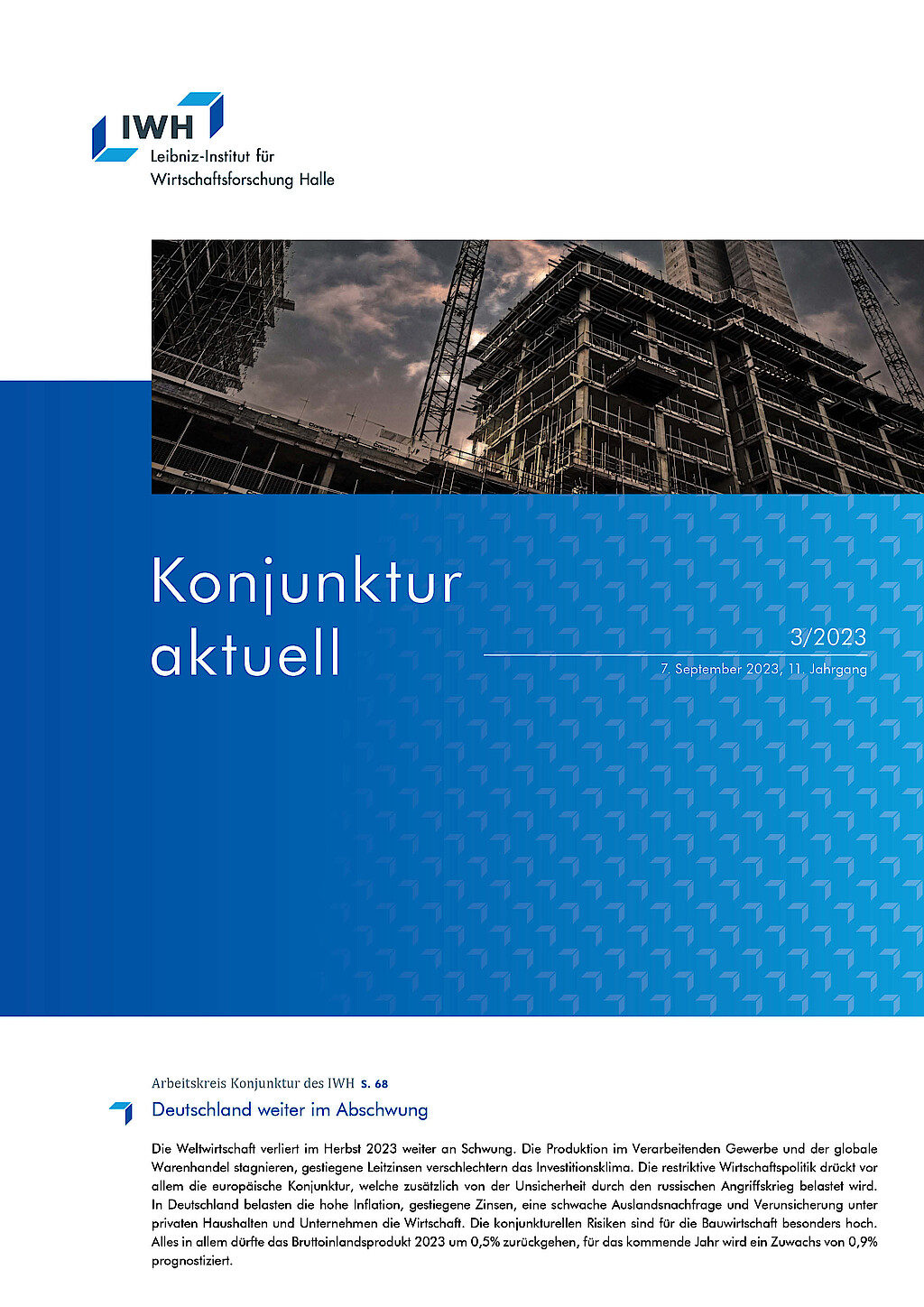The German economy continues its downturn

The global economy continues to lose momentum in autumn 2023. Manufacturing output and international trade in goods have been stagnating since the pandemic-related surge in demand faded last year, and the interest rate hike weighs on investment activity. Inflation is still strong enough to dampen consumer demand in many places. Key interest rates will have to remain high until well into 2024. Since labour shortages continue in North America and Europe, wage cost pressures on prices will persist in the coming quarters. The overall restrictive economic policy is depressing the European economy in particular, because Europe is burdened by the uncertainty brought about by the Russian war. The Chinese economy is also in a downturn. In contrast, the robust US economy benefits from favourable growth conditions.
The German economy is in a downturn. The loss of real income due to high inflation and the uncertainty caused by the energy crisis had led private households to reduce their consumption during last winter, and there was no rebound in the second quarter of this year. The manufacturing sector is suffering from high energy costs and weak foreign demand. However, firms have, due to structural shortages of skilled labour, continued to expand their workforce. This will no longer be the case for the rest of the year, since expectations have recently become ever more pessimistic. Residential investment will fall significantly because of the marked rise in financing costs. Investment in equipment, on the other hand, will get a small boost from public spending for military equipment and from depreciation possibilities due to the coming “Wachstumschancengesetz”. More importantly, higher energy prices and the switch to electro mobility will induce a number of investments. In addition, private consumption should gradually pick up, as real disposable incomes will slowly increase with falling inflation. “Overall, production in Germany is likely to decline in the third quarter of 2023 and to expand moderately again in the following quarters,” says Oliver Holtemöller, head of the Macroeconomics Department and vice president at the IWH. Consumer price inflation will probably remain above the European Central Bank’s (ECB) target value until 2025.
“The economic risks for the construction industry are particularly high,” says Holtemöller. Financing costs have risen sharply, intermediate goods, despite recent price declines, are significantly more expensive than they were a few years ago, and construction productivity is on a downward trend. “Housing construction will not recover until costs have fallen enough to make the creation of housing for people with average income profitable again. It is an open question whether such a strong cost reduction is possible within the current institutional framework,” the economist says.
The extended version of the forecast contains three boxes (all in German):
Box 1: Key assumptions underlying the forecast
Box 2: On recent revisions of national accounts data
Box 3: On the estimate of potential output
Publication:
Drygalla, Andrej; Exß, Franziska; Heinisch, Katja; Holtemöller, Oliver; Kämpfe, Martina; Kozyrev, Boris; Lindner, Axel; Mukherjee, Sukanya; Sardone, Alessandro; Schult, Christoph; Schultz, Birgit; Zeddies, Götz: Konjunktur aktuell: Deutschland weiter im Abschwung. IWH, Konjunktur aktuell, Jg. 11 (3), 2023. Halle (Saale) 2023.
Whom to contact
For Researchers

Vice President Department Head
If you have any further questions please contact me.
+49 345 7753-800 Request per E-MailFor Journalists

Internal and External Communications
If you have any further questions please contact me.
+49 345 7753-832 Request per E-MailIWH list of experts
The IWH list of experts provides an overview of IWH research topics and the researchers and scientists in these areas. The relevant experts for the topics listed there can be reached for questions as usual through the IWH Press Office.
Related Publications

Konjunktur aktuell: Deutschland weiter im Abschwung
in: Konjunktur aktuell, 3, 2023
Abstract
Die Weltwirtschaft verliert im Herbst 2023 weiter an Schwung. Die Produktion im Verarbeitenden Gewerbe und der globale Warenhandel stagnieren, gestiegene Leitzinsen verschlechtern das Investitionsklima. Die restriktive Wirtschaftspolitik drückt vor allem die europäische Konjunktur, welche zusätzlich von der Unsicherheit durch den russischen Angriffskrieg belastet wird. In Deutschland belasten die hohe Inflation, gestiegene Zinsen, eine schwache Auslandsnachfrage und Verunsicherung unter privaten Haushalten und Unternehmen die Wirtschaft. Die konjunkturellen Risiken sind für die Bauwirtschaft besonders hoch. Alles in allem dürfte das Bruttoinlandsprodukt 2023 um 0,5% zurückgehen, für das kommende Jahr wird ein Zuwachs von 0,9% prognostiziert.



